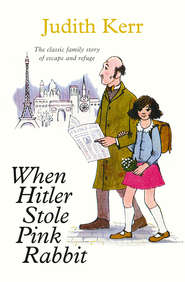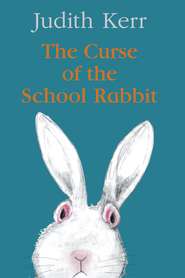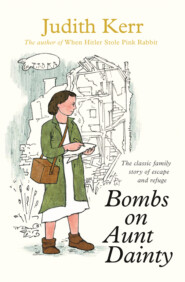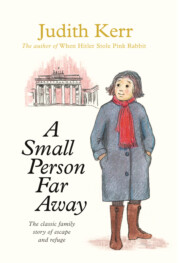По всем вопросам обращайтесь на: info@litportal.ru
(©) 2003-2024.
✖
Out of the Hitler Time trilogy: When Hitler Stole Pink Rabbit, Bombs on Aunt Dainty, A Small Person Far Away
Настройки чтения
Размер шрифта
Высота строк
Поля
Gunther was the hardest person to leave. Max brought him back to lunch after they had walked back from school together for the last time, though there were only sandwiches because Heimpi had not had time to cook. Afterwards they played hide-and-seek rather half-heartedly among the packing cases. It was not much fun because Max and Gunther were so gloomy and Anna had a struggle to keep down her own excitement. She was fond of Gunther and sorry to leave him. But all she could think was, “This time tomorrow we’ll be on the train …this time on Sunday we’ll be in Switzerland …this time on Monday …?”
At last Gunther went home. Heimpi had sorted out a lot of clothes for his mum in the course of her packing and Max went with him to help him carry them. When he came back he seemed more cheerful. He had dreaded saying goodbye to Gunther more than anything. Now at least it was over.
Next morning Anna and Max were ready long before it was time to leave. Heimpi checked that their nails were clean, that they both had handkerchiefs – two for Anna because she had a bit of a cold – and that their socks were held up properly by elastic bands.
“Goodness knows what state you’ll get into by yourselves,” she grumbled.
“But you’ll be with us again in a fortnight,” said Anna.
“There’s a lot of dirt can settle on a neck in a fortnight,” said Heimpi darkly.
Then there was nothing more to do until the taxi came.
“Let’s go right through the house for the last time,” said Max.
They started at the top and worked down. Most of it no longer looked like itself. All the smaller things had been packed: some of the rugs had been rolled up and there were newspaper and packing cases everywhere. They ticked off the rooms as they went through them, shouting “Goodbye, Papa’s bedroom …goodbye, landing …goodbye, stairs …!”
“Don’t get too excited,” said Mama as they passed her.
“Goodbye, hall …goodbye, drawing room …!”
They were getting through too quickly, so Max shouted, “Goodbye, piano …goodbye, sofa …!” and Anna took it up with, “Goodbye, curtains …goodbye, dining table …goodbye, hatch …!”
Just as she shouted, “Goodbye, hatch”, its two small doors opened and Heimpi’s head appeared looking through from the pantry. Suddenly something contracted in Anna’s stomach. This was just what Heimpi had often done to amuse her when she was small. They had played a game called “peeping through the hatch” and Anna had loved it. How could she suddenly be going away? In spite of herself her eyes filled with tears and she cried, idiotically, “Oh Heimpi, I don’t want to leave you and the hatch!”
“Well I can’t pack it in my suitcase,” said Heimpi, coming into the dining room.
“You’re sure you’ll come to Switzerland?”
“I don’t know what else I’d do,” said Heimpi. “Your mama has given me my ticket and I’ve got it in my purse.”
“Heimpi,” said Max, “if you suddenly found you had a lot of room in your suitcase – only if, mind you – do you think you could bring the games compendium?”
“If …if …if …” said Heimpi. “If my grandmother had wheels she’d be a bus and we could all go for a ride in her.” That was what she always said.
Then the doorbell rang to announce the arrival of the taxi and there was no more time. Anna hugged Heimpi. Mama said, “Don’t forget the men are coming for the piano on Monday”, and then she too hugged Heimpi. Max could not find his gloves but had them in his pocket all the time. Bertha wept, and the man who looked after the garden suddenly appeared and wished them all a pleasant journey.
Just as the taxi was about to drive off a small figure rushed up with something in his hand. It was Gunther. He thrust a parcel at Max through the window and said something about his mum which they could not understand because the taxi had started. Max shouted goodbye and Gunther waved. Then the taxi went up the street. Anna could still see the house, and Heimpi and Gunther waving …She could still see a bit of the house …At the top of the street they passed the Kentner children on their way to school. They were talking to each other and did not look up …She could still see a tiny bit of the house through the trees …Then the taxi went round the corner and it all disappeared.
It was strange travelling on the train with Mama and without Heimpi. Anna was a little worried in case she felt sick. She had been train-sick a lot when she was small and even now that she had more or less outgrown it Heimpi always brought a paper bag just in case. Did Mama have a paper bag?
The train was crowded and Anna and Max were glad that they had window seats. They both looked out at the grey landscape tearing past until it began to rain. Then they watched the raindrops arrive with a splash and slowly trickle down the glass pane, but it became boring after a while. What now? Anna looked at Mama out of the corner of her eye. Heimpi usually had a few apples or some sweets about her.
Mama was leaning back in her seat. The corners of her mouth were pulled down and she was staring at the bald head of the man opposite without seeing him at all. On her lap was her big handbag with the picture of a camel on it which she had brought back from some journey with Papa. She was holding it very tight – Anna supposed because the tickets and passports were in it. She was clutching it so hard that one of her fingers was digging right in the camel’s face.
“Mama,” said Anna, “you’re squashing the camel.”
“What?” said Mama. Then she realized what Anna meant and loosened her hold on the bag. The camel’s face reappeared, to Anna’s relief, looking just as foolish and hopeful as usual.
“Are you bored?” asked Mama. “We’ll be travelling right through Germany, which you have never done. I hope the rain stops soon so that you can see it all.”
Then she told them about the orchards in Southern Germany – miles and miles of them. “If only we were making this journey a little later in the year,” she said, “you’d be able to see them all in blossom.”
“Perhaps just a few of them might be out already,” said Anna.
But Mama thought it was too early and the bald man agreed. Then they said how beautiful it was, and Anna wished she could see it.
“If the blossom isn’t out this time,” she said, “can we see it another time?”
Mama did not answer at once. Then she said, “I hope so.”
The rain did not let up and they spent a lot of time playing guessing games at which Mama turned out to be very good. Though they could not see much of the country they could hear the change in people’s voices every time the train stopped. Some were almost incomprehensible and Max hit on the idea of asking unnecessary questions like, “Is this Leipzig?” or “What time is it?” just for the pleasure of hearing the strangely accented replies.
They had lunch in the dining car. It was very grand, with a menu to choose from, and Anna had frankfurters and potato salad which was her favourite dish. She did not feel train-sick at all.
Later in the afternoon she and Max walked through the train from end to end and then stood in the corridor. The rain was heavier than ever and dusk came very early. Even if the orchards had been in blossom they would not have been able to see them. For a while they amused themselves by watching the fleeing darkness through their reflections on the glass. Then Anna’s head began to ache and her nose began to run as though to keep pace with the rain outside. She snuggled back into her seat and wished they would get to Stuttgart.
“Why don’t you look at Gunther’s book?” said Mama.
There had been two presents in Gunther’s parcel. One, from Gunther to Max, was a puzzle – a little transparent box with a picture of an open-mouthed monster drawn on the bottom. You had to get three tiny balls into the monster’s mouth. It was very difficult to do on a train.
The other was a book for both children from Gunther’s mum. It was called They Grew to be Great and she had written in it, “Thank you for all the lovely things – something to read on the journey.” It described the early lives of various people who later became famous, and Anna, who had a personal interest in the subject, leafed through it eagerly at first. But the book was so dully written and its tone was so determinedly uplifting that she gradually became discouraged.
All the famous people had had an awful time. One of them had a drunken father. Another had a stammer. Another had to wash hundreds of dirty bottles. They had all had what was called a difficult childhood. Clearly you had to have one if you wanted to become famous.
Dozing in her corner and mopping her nose with her two soaked handkerchiefs, Anna wished that they would get to Stuttgart and that one day, in the long-distant future, she might become famous. But as the train rumbled through Germany in the darkness she kept thinking “difficult childhood …difficult childhood …difficult childhood …”
Chapter Four (#ulink_8eb0ae6b-36dc-5f8d-9ee4-b03f52e5f0e9)
Suddenly she found herself being gently shaken. She must have been asleep. Mama said, “We’ll be in Stuttgart in a few minutes.”
Anna sleepily put on her coat, and soon she and Max were sitting on the luggage at the entrance of Stuttgart station while Mama went to get a taxi. The rain was still pelting down, drumming on the station roof and falling like a shiny curtain between them and the dark square in front of them. It was cold. At last Mama came back.
“What a place!” she cried. “They’ve got some sort of a strike on – something to do with the elections – and there are no taxis. But you see that blue sign over there?” On the opposite side of the square there was a bluish gleam among the wet. “That’s a hotel,” said Mama. “We’ll just take what we need for the night and make a dash for it.”
With the bulk of the luggage safely deposited they struggled across the ill-lit square. The case Anna was carrying kept banging against her leg and the rain was so heavy that she could hardly see. Once she missed her footing and stepped into a deep puddle so that her feet were soaked. But at last they were in the dry. Mama booked rooms for them and then she and Max had something to eat. Anna was too tired. She went straight to bed and to sleep.
In the morning they got up while it was still dark. “We’ll soon see Papa,” said Anna as they ate their breakfast in the dimly-lit dining room. Nobody else was up yet and the sleepy-eyed waiter seemed to grudge them the stale rolls and coffee which he banged down in front of them. Mama waited until he had gone back into the kitchen. Then she said, “Before we get to Zurich and see Papa we have to cross the frontier between Germany and Switzerland.”
“Do we have to get off the train?” asked Max.
“No,” said Mama. “We just stay in our compartment and then a man will come and look at our passports – just like the ticket inspector. But” – and she looked at both children in turn – “this is very important. When the man comes to look at our passports I want neither of you to say anything. Do you understand? Not a word.”
“Why not?” asked Anna.
“Because otherwise the man will say ‘What a horrible talkative little girl, I think I’ll take away her passport’,” said Max, who was always bad-tempered when he had not had enough sleep.
“Mama!” appealed Anna. “He wouldn’t really – take away our passports, I mean?”









